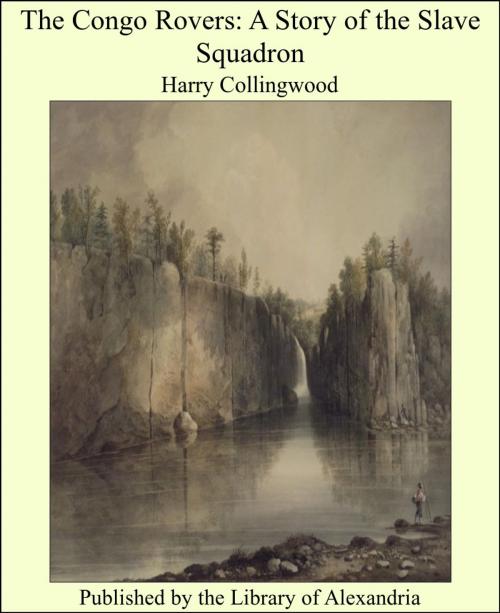The Congo Rovers: A Story of the Slave Squadron
Nonfiction, Religion & Spirituality, New Age, History, Fiction & Literature| Author: | Harry Collingwood | ISBN: | 9781465534095 |
| Publisher: | Library of Alexandria | Publication: | July 29, 2009 |
| Imprint: | Library of Alexandria | Language: | English |
| Author: | Harry Collingwood |
| ISBN: | 9781465534095 |
| Publisher: | Library of Alexandria |
| Publication: | July 29, 2009 |
| Imprint: | Library of Alexandria |
| Language: | English |
My first Appearance in Uniform. “Um!” ejaculated my father as he thoughtfully removed his double eye-glass from his nose with one hand, and with the Other passed a letter to me across the breakfast-table—“Um! this letter will interest you, Dick. It is from Captain Vernon.” My heart leapt with sudden excitement, and my hand trembled as I stretched it out for the proffered epistle. The mention of Captain Vernons name, together with the announcement that the subject-matter of the letter was of interest to me, prepared me in a great measure for the intelligence it conveyed; which was to the effect that the writer, having been appointed to the command of the sloop-of-war Daphne, now found himself in a position to fulfil a promise of some standing to his dear and honoured friend Dr Hawkesley (my father) by receiving his son (myself) on board the sloop, with the rating of midshipman. The sloop, the letter went on to say, was commissioned for service on the west coast of Africa; and if I decided to join her no time should be lost in procuring my outfit, as the Daphne was under orders to sail on the —; just four days from the date of the receipt of the letter. “Well, Dick, what do you think of Captain Vernons proposal?” inquired my father somewhat sadly, as I concluded my perusal of the letter and raised my eyes to his. “Oh, father!” I exclaimed eagerly, “I hope you will consent to let me go. Perhaps I may never have anOther such an opportunity; and I am quite sure I shall never care to be anything but a sailor.” “Ah! yes—the old, old story,” murmured my father, shaking his head dubiously. “Thousands of lads have told their fathers exactly the same thing, and have lived to bitterly regret their choice of a profession. Look at my life. I have to run about in all weathers; to take my meals when and how I can; there is not a single hour in the twenty-four that I can call my own; it is a rare thing for me to get a night of undisturbed rest; it is a hard, anxious, harassing life that I lead—you have often said so yourself, and urged it as one of the reasons why you object to follow in my footsteps. But I tell you, Dick, that my life—ay, or the life even of the poorest country practitioner, for that matter—is one of ease and luxury compared with that of a sailor. But I have said all this to you over and over again, without convincing you; and I hardly dare hope that I shall be more successful now; so, if you are really quite resolved to go to sea, I will offer no Further objections. It is true that you will be going to an unhealthy climate; but God is just as well able to preserve you there as He is here; and then, again, you have a strong healthy constitution, which, fortified with such preservative medicines as I can supply, will, I hope, enable you to withstand the malaria and to return to us in safety. Now, what do you say—are you still resolved to go?” “Quite,” I replied emphatically. “Now that you have given your consent the last obstacle is removed, and I can follow with a light heart the bent of my own inclinations.” “Very well, then,” said my father, rising from the table and pushing back his chair. “That question being settled, we had better call upon Mr Shears forthwith and give the order for your uniform and outfit. There is no time to lose; and since go you will, I would very much rather you went with Vernon than with anyone else.” The above conversation took place, as already stated, in the breakfast-room of my fathers house. My father was at that time—as he continued to be until the day of his death—the leading physician in Portsmouth; and his house—a substantial four-storey building—stood near the top of the High Street. The establishment of Mr Shears, “Army and Navy Tailor, Clothier, and Outfitter,” was situated near the bottom of the same street. A walk, therefore, of some ten minutes duration took us to our destination; and at the end of a Further half-hours anxious consultation I had been measured for my uniform—one suit of which was faithfully promised for the next day—had chosen my sea-chest, and had selected a complete outfit of such clothing as was to be obtained ready-made. This important business concluded, my father departed upon his daily round of visits, and I had the remainder of the day at my own disposal. My first act on emerging from the door of Mr Shears establishment was to hasten off to the dockyard at top speed to take anOther look at the Daphne. I had often seen the craft before; had taken an interest in her, indeed, I may say, from the moment that her keel was laid—she was built in Portsmouth dockyard—and had watched her progress to completion and her recent launch with an admiration which had steadily increased until it grew into positive love. And now I was actually to have the happiness, the bliss, of going to sea in her as an officer on her first cruise. Ecstatic thought! I felt as though I was walking on air
My first Appearance in Uniform. “Um!” ejaculated my father as he thoughtfully removed his double eye-glass from his nose with one hand, and with the Other passed a letter to me across the breakfast-table—“Um! this letter will interest you, Dick. It is from Captain Vernon.” My heart leapt with sudden excitement, and my hand trembled as I stretched it out for the proffered epistle. The mention of Captain Vernons name, together with the announcement that the subject-matter of the letter was of interest to me, prepared me in a great measure for the intelligence it conveyed; which was to the effect that the writer, having been appointed to the command of the sloop-of-war Daphne, now found himself in a position to fulfil a promise of some standing to his dear and honoured friend Dr Hawkesley (my father) by receiving his son (myself) on board the sloop, with the rating of midshipman. The sloop, the letter went on to say, was commissioned for service on the west coast of Africa; and if I decided to join her no time should be lost in procuring my outfit, as the Daphne was under orders to sail on the —; just four days from the date of the receipt of the letter. “Well, Dick, what do you think of Captain Vernons proposal?” inquired my father somewhat sadly, as I concluded my perusal of the letter and raised my eyes to his. “Oh, father!” I exclaimed eagerly, “I hope you will consent to let me go. Perhaps I may never have anOther such an opportunity; and I am quite sure I shall never care to be anything but a sailor.” “Ah! yes—the old, old story,” murmured my father, shaking his head dubiously. “Thousands of lads have told their fathers exactly the same thing, and have lived to bitterly regret their choice of a profession. Look at my life. I have to run about in all weathers; to take my meals when and how I can; there is not a single hour in the twenty-four that I can call my own; it is a rare thing for me to get a night of undisturbed rest; it is a hard, anxious, harassing life that I lead—you have often said so yourself, and urged it as one of the reasons why you object to follow in my footsteps. But I tell you, Dick, that my life—ay, or the life even of the poorest country practitioner, for that matter—is one of ease and luxury compared with that of a sailor. But I have said all this to you over and over again, without convincing you; and I hardly dare hope that I shall be more successful now; so, if you are really quite resolved to go to sea, I will offer no Further objections. It is true that you will be going to an unhealthy climate; but God is just as well able to preserve you there as He is here; and then, again, you have a strong healthy constitution, which, fortified with such preservative medicines as I can supply, will, I hope, enable you to withstand the malaria and to return to us in safety. Now, what do you say—are you still resolved to go?” “Quite,” I replied emphatically. “Now that you have given your consent the last obstacle is removed, and I can follow with a light heart the bent of my own inclinations.” “Very well, then,” said my father, rising from the table and pushing back his chair. “That question being settled, we had better call upon Mr Shears forthwith and give the order for your uniform and outfit. There is no time to lose; and since go you will, I would very much rather you went with Vernon than with anyone else.” The above conversation took place, as already stated, in the breakfast-room of my fathers house. My father was at that time—as he continued to be until the day of his death—the leading physician in Portsmouth; and his house—a substantial four-storey building—stood near the top of the High Street. The establishment of Mr Shears, “Army and Navy Tailor, Clothier, and Outfitter,” was situated near the bottom of the same street. A walk, therefore, of some ten minutes duration took us to our destination; and at the end of a Further half-hours anxious consultation I had been measured for my uniform—one suit of which was faithfully promised for the next day—had chosen my sea-chest, and had selected a complete outfit of such clothing as was to be obtained ready-made. This important business concluded, my father departed upon his daily round of visits, and I had the remainder of the day at my own disposal. My first act on emerging from the door of Mr Shears establishment was to hasten off to the dockyard at top speed to take anOther look at the Daphne. I had often seen the craft before; had taken an interest in her, indeed, I may say, from the moment that her keel was laid—she was built in Portsmouth dockyard—and had watched her progress to completion and her recent launch with an admiration which had steadily increased until it grew into positive love. And now I was actually to have the happiness, the bliss, of going to sea in her as an officer on her first cruise. Ecstatic thought! I felt as though I was walking on air















